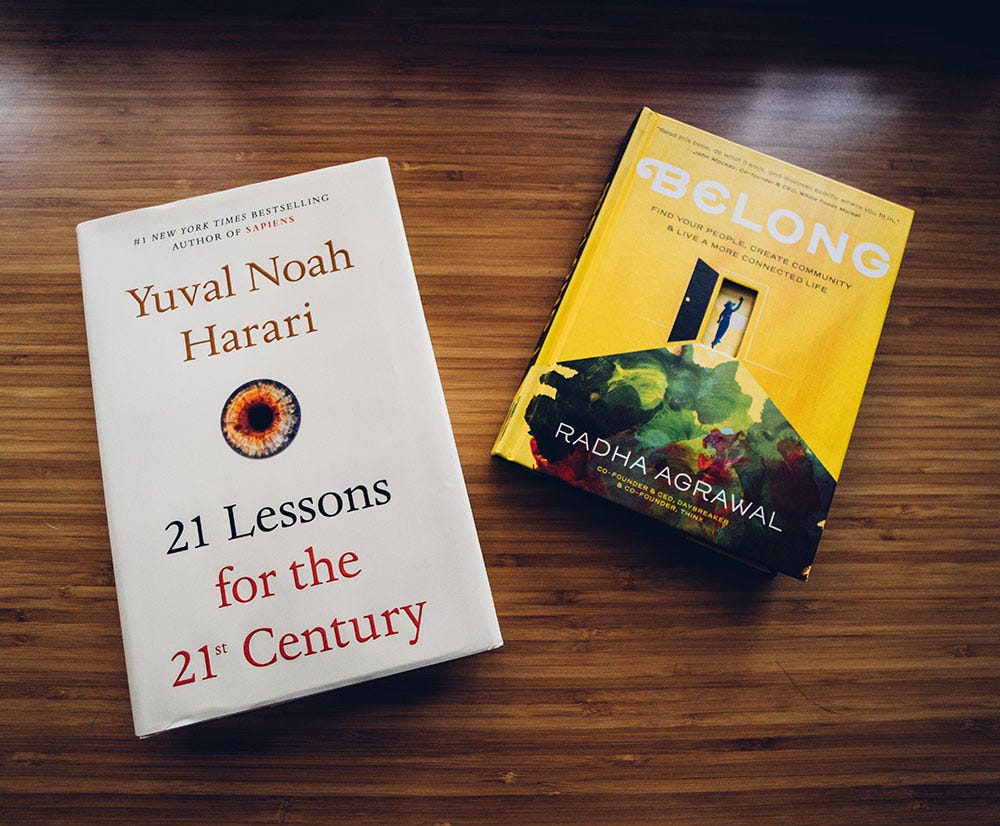Finding your people
Plan Your Next: Letter No. 12
Good morning!
I’m working on a couple letters about community and belonging, but I’m not quite finished :(
I started thinking about these themes after being inspired by a couple events that took place this week. And while this letter might be slightly different than the others, I do want to share a couple books that I’m reading. It’s all intertwined. I promise!

He is an incredible writer, and the author of my favorite book last year, “Sapiens: A brief History of Humankind.” (He wrote it in 2014; I’m a bit behind.)
By attending this event, it got me thinking about communities that I want to be a part of. I’m obviously lacking them, having moved to a new city, but starting from scratch is a pretty invigorating feeling. You can only go up from here.
When I lived in Minnesota, I never really participated in events that were outside the interests of my circle of friends. I never really wanted to venture out by myself, and so I stayed in my comfort zone.
I could count on one hand how many book events I went to.
Holy shit, what was I missing out on?
Back to the event: Yuval Harari is known for talking about humanity and biology in the past, present, and future.
If you are to read the excerpts of this new book, his outlook on humanity is frighteningly grim. However, if you read between the lines, he gives some indications that as fractured as our world is, we have found ways to have worked together in the past.
He talked briefly about how we’re at a point in time we’re we can’t possible predict what the world will look like in 30 years. Even science fiction authors are doing a poor job.
One of the most recent movies, Ready Player One, was set in 2040, but we’re wearing VR headsets that are available today? I don’t think so. Although it’s not a stretch of the imagination to think that we’re going to be plugged into a world where all we’re asked to do is to consume.
Stepping back, we’re at a time where we don’t fully know what the future holds. This is what makes it so fascinating to listen to visionaries like Elon Musk talk about what the near future holds, because he’s trying to build companies that blend what we’ll be able to accomplish in the next 10-20 years, which seems far fetched.
Part of not knowing, extends into our political leadership as well. It’s incredibly difficult to have a vision for the future, and so it’s part of our DNA to seek out nostalgic moments where we felt comfortable and secure.
We’re a global community now more than ever, and Yuval makes the point that our collective thinking should be about how we’re dealing with nuclear war, climate change, and technological disruption. The last being the most difficult. As a global community, it’s easy to agree on the first two points. The last, technological disruption, is controversial because you have people advocating for it, as well as the people scared of what seems inevitable.
Instead of solving for how technology will be automating jobs in the not too distant future, it’s easier for our leaders to talk about immigration, and nationalism. This is the wrong narrative that Yuval tries to make.
I’ve just started reading this book but it’s already captivating.
The timing is important
Have you ever had that experience where the book you’re reading feels like you just met your soul mate? The timing lines up perfectly, as though its answering every question you have been asking yourself in that that day, week, or month.
That’s exactly how it is with this latest one I’ve been reading this week. I found it from an Instagram story post (otherwise I’d link the post here), and it’s all about building and finding your community.
If you’re at all like me, thinking about networks and building relationships, you should pick this up.
Radha Agrawal is the co-founder of Daybreaker (half a million people) and THINX. She wrote this book based on her experiences building these communities.
It’s easier than ever for brands and corporations to throw words like “community” and “belonging” around, casting a wide net for anyone who feels disconnected.
What’s more difficult, is taking the time to understand your own values, abilities and interests, and then building or seeking out communities based on people like ourselves.
Sometimes you can go through life, making friends based on chance, but it doesn’t have to be that way. It takes effort, and this book talks about avoiding the distraction and being intentional about finding communities that cater to you.
It’s natural to want to belong, but how do you go about finding your people?
My own goal is to take the time to figure that out, either by finding my existing community, or by building it.
My question for you
What are some ways that you have found your communities?
Reading Resources
This is Plan Your Next. It’s a conversation about being ready for what’s next. Well, because there is always a next. I’m Nate, designer, and conductor of this group.
If you have something to share or add, please hit reply and expect a response!


